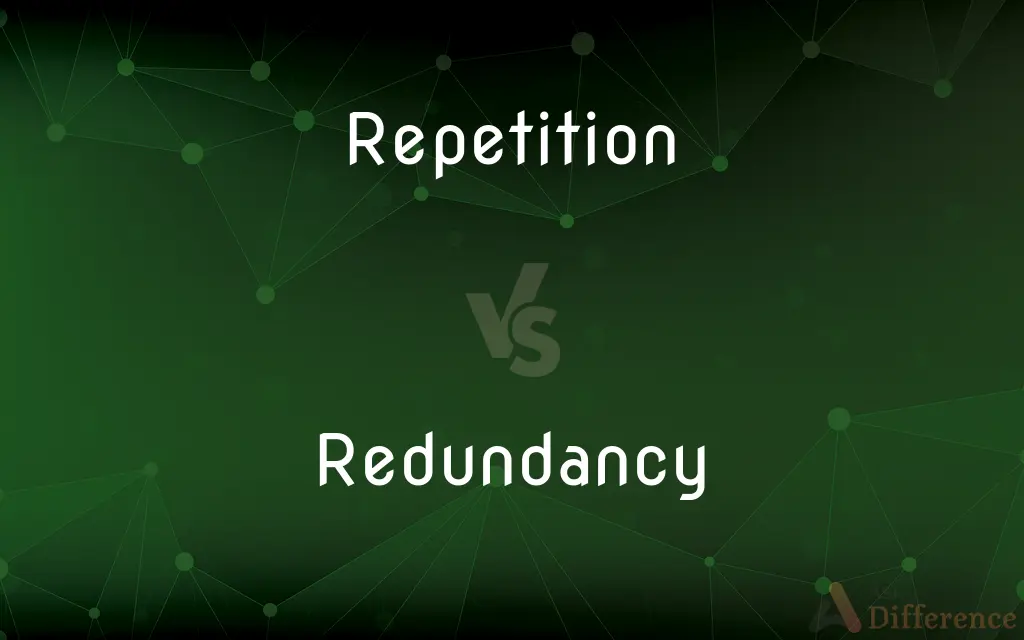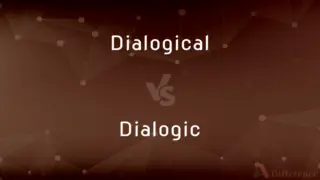Repetition vs. Redundancy — What's the Difference?
By Tayyaba Rehman & Urooj Arif — Updated on March 21, 2024
Repetition involves the act of doing or saying something again, often for emphasis or clarity, while redundancy is the unnecessary duplication of elements, adding no value or information.

Difference Between Repetition and Redundancy
Table of Contents
ADVERTISEMENT
Key Differences
Repetition is a deliberate rhetorical or artistic strategy, used to emphasize a point, enhance memorization, or create a pattern within a text or speech. It serves a specific purpose, whether in literature, speeches, or music, by reinforcing messages or themes. Whereas redundancy refers to the presence of superfluous information or components that could be eliminated without losing meaning or function, often seen as a lack of efficiency or clarity in communication.
While repetition can be a powerful tool in enhancing understanding or creating an aesthetic effect, redundancy typically detracts from the message's effectiveness by cluttering communication with unnecessary details. For example, in poetry or songwriting, repetition might be used to evoke certain emotions or underscore a motif; in contrast, redundancy in writing or speech might manifest as needless repetition of ideas or phrases that do not contribute additional value.
Repetition and redundancy diverge significantly in their perceived value within a text or discourse. Repetition is generally viewed positively when used with intention, contributing to the depth or impact of communication. On the other hand, redundancy is often seen as a negative attribute, suggesting poor editing or a lack of precision in thought.
In educational settings, repetition is employed as a pedagogical tool to aid learning and retention. Repetitive practice or review of material helps reinforce knowledge and skills. Redundancy, however, is usually undesirable in academic writing or professional communication, as it can obscure the main points and lead to confusion or disengagement among readers or listeners.
Identifying the line between effective repetition and problematic redundancy is crucial in communication. What distinguishes beneficial repetition from redundancy is its contribution to achieving the communicator's goal, whether for emphasis, stylistic effect, or reinforcement of ideas, as opposed to unnecessary repetition that serves no clear purpose.
ADVERTISEMENT
Comparison Chart
Purpose
To emphasize, enhance memorization, or create pattern.
To inadvertently duplicate, adding no value.
Perception
Generally positive when used intentionally.
Often viewed negatively, as wasteful or unclear.
Use in Communication
Deliberate, for rhetorical or artistic effect.
Unintended, detracting from clarity and efficiency.
Examples
Literary motifs, chorus in songs, review in study.
Unnecessary words in sentences, duplicate data.
Impact
Can strengthen the message or aesthetic appeal.
Clutters communication, potentially causing confusion.
Compare with Definitions
Repetition
In music, repetition creates memorable melodies.
The chorus is repeated throughout the song, making it catchy.
Redundancy
Overlapping functions or roles in organizations.
Two departments handling customer complaints led to redundancy.
Repetition
The act of repeating something for effect.
Martin Luther King Jr.'s repeated use of I have a dream underscored his vision.
Redundancy
In writing, using more words than needed.
In my opinion, I think is redundant.
Repetition
Employed to reinforce concepts or skills.
Repetitive drills in math help students master the basics.
Redundancy
Technical systems with unnecessary backups.
Redundant data storage may be overly cautious for non-critical info.
Repetition
Used in speeches for emphasis and recall.
The speaker used repetition to make her key points more memorable.
Redundancy
When editing, removing redundancies clarifies.
Cutting redundant phrases can make writing more concise.
Repetition
A literary device to emphasize a theme.
The poem's repetition of the word darkness highlighted its mood.
Redundancy
Unnecessary duplication in communication.
Saying free gift is redundant since gifts are inherently free.
Repetition
The act or process or an instance of repeating or being repeated.
Redundancy
The state of being redundant.
Repetition
A recitation or recital, especially of prepared or memorized material.
Redundancy
Something redundant or excessive; a superfluity.
Repetition
The act or an instance of repeating or being repeated.
Redundancy
Repetition of linguistic information inherent in the structure of a language, as singularity in the sentence It works.
Repetition
(weightlifting): The act of performing a single, controlled exercise motion. A group of repetitions is a set.
Redundancy
Excessive wordiness or repetition in expression.
Repetition
To petition again.
Redundancy
The state or fact of being unemployed because work is no longer offered or considered necessary.
Repetition
The act of repeating; a doing or saying again; iteration.
I need not be barren of accusations; he hath faults, with surplus to tire in repetition.
Redundancy
A dismissal of an employee from work for being no longer necessary; a layoff.
Repetition
Recital from memory; rehearsal.
Redundancy
(Electronics) Duplication or repetition of elements in electronic equipment to provide alternative functional channels in case of failure.
Repetition
The act of repeating, singing, or playing, the same piece or part a second time; reiteration of a note.
Redundancy
Repetition of parts or all of a message to circumvent transmission errors.
Repetition
Reiteration, or repeating the same word, or the same sense in different words, for the purpose of making a deeper impression on the audience.
Redundancy
(Genetics) See degeneracy.
Repetition
The measurement of an angle by successive observations with a repeating instrument.
Redundancy
The state of being redundant
Repetition
An event that repeats;
The events today were a repeat of yesterday's
Redundancy
A superfluity; something redundant or excessive; a needless repetition in language
Repetition
The act of doing or performing again
Redundancy
Duplication of components or circuits to provide survival of the total system in case of failure of single components.
Repetition
The repeated use of the same word or word pattern as a rhetorical device
Redundancy
Duplication of parts of a message to guard against transmission errors.
Redundancy
The state of being unemployed because one's job is no longer necessary; the dismissal of such an employee; a layoff.
Redundancy
(law) surplusage inserted in a pleading which may be rejected by the court without impairing the validity of what remains.
Redundancy
Repetition of messages to reduce the probability of errors in transmission
Redundancy
The attribute of being superfluous and unneeded;
The use of industrial robots created redundancy among workers
Redundancy
(electronics) a system design that duplicates components to provide alternatives in case one component fails
Redundancy
Repetition of an act needlessly
Common Curiosities
How can one avoid redundancy in writing?
By carefully editing to remove unnecessary words or phrases and ensuring each element adds new information or value.
Can redundancy ever be positive?
In technical systems, redundancy can be positive for ensuring reliability and safety, despite being generally negative in communication.
Why might redundancy occur in organizational structures?
It can result from poor planning, unclear roles, or overcautious strategies to mitigate risk.
Is redundancy always avoidable?
While often avoidable in communication, some degree of redundancy may be necessary in certain contexts for clarity or emphasis.
How does repetition aid in learning?
It reinforces memory and understanding by exposing the learner to information or skills multiple times.
Why is repetition used in literature?
Repetition is used to emphasize themes, enhance rhythm, and make passages more memorable.
What is the effect of repetition in speeches?
It makes key points more memorable and can stir emotions, making the speech more impactful.
How can redundancy in technical systems be justified?
By the need for backup systems to ensure continuity in case of failure, prioritizing safety and reliability over efficiency.
What distinguishes repetition from redundancy in writing?
Repetition is the purposeful use to add emphasis or style, while redundancy is unnecessary duplication that adds no value.
Can repetition be negative?
If overused or without clear purpose, repetition can become tedious and detract from the message.
Share Your Discovery

Previous Comparison
Addendum vs. Annex
Next Comparison
Dialogical vs. DialogicAuthor Spotlight
Written by
Tayyaba RehmanTayyaba Rehman is a distinguished writer, currently serving as a primary contributor to askdifference.com. As a researcher in semantics and etymology, Tayyaba's passion for the complexity of languages and their distinctions has found a perfect home on the platform. Tayyaba delves into the intricacies of language, distinguishing between commonly confused words and phrases, thereby providing clarity for readers worldwide.
Co-written by
Urooj ArifUrooj is a skilled content writer at Ask Difference, known for her exceptional ability to simplify complex topics into engaging and informative content. With a passion for research and a flair for clear, concise writing, she consistently delivers articles that resonate with our diverse audience.















































